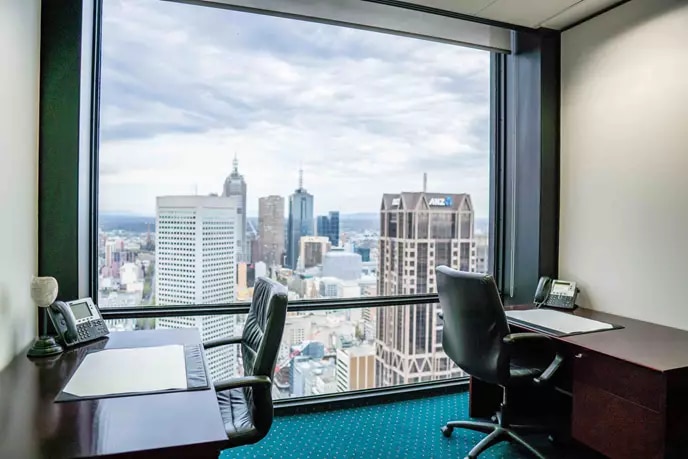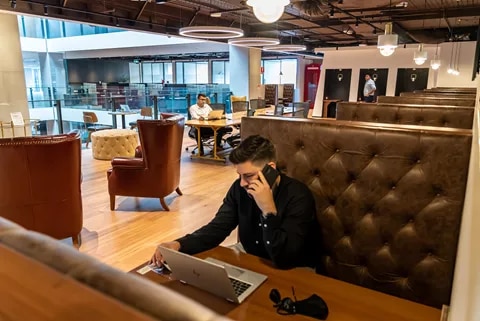How Much Office Space Do I Need Per Employee in Malaysia?
By Varun Bodhi

When setting up a new business or moving to a new location, one of the most important questions you’ll need ask is how much office space do I need?
The short answer is: it depends.
Different types of businesses will have different office space needs, and you will have to take into account the future needs of your business. If your business is growing, your office space will also need to accommodate this.
There are many factors you’ll need to consider to get the perfect sized space for your needs. Below, we look at average office space for different types of businesses, how to plan your office space and a guide to calculating office space to help you work out how much you’ll really need
The numbers
According to Corporate Locations’ space calculator, most businesses allow between 100 to 140 square feet of room per person in Malaysia. This number usually depends on the company headcount, however many businesses will require significantly more than this standard.
It’s important to note that the average space requirement considers the entire space, including ancillary office space such as meeting and common rooms, hallways and bathrooms. Keeping this in mind, the actual dedicated workspace each employee receives will be reasonably lower than the numbers mentioned.
High density offices such as call centres may be able to operate with minimal space, but the average office will need to be bigger, especially for professional services such as accounting or law, where more private office space is needed.
Having bigger, open office space architecture and more common rooms can also help with employee satisfaction, resulting in improved productivity.
Those who work in creative fields can also benefit from open and airy types of environments and the ability to move across different spaces within the office.
How many staff are full-time and how many are part-time or casual may also influence how much office space you need. Likewise if employees sometimes work from home. Using shared office space for staff who aren’t in the office everyday can help you cut down on office space needed.
How big is the average office space?
The total size of an office space will depend on the total number of employees.
But the average space per employee for a general office is around 12-14 sqm per person.
Professional services businesses like accounting or law firms often need more private office space and generally require around 14-20 sqm per person.
Though many contemporary office spaces for these types of businesses are becoming smaller, as businesses become more efficient with how they use space.
Many businesses are also moving towards “creative office spaces” which go beyond the traditional office layout to provide a unique and highly desirable space for their employees. This can help with attracting and retaining top talent, and with improving productivity and morale. These types of offices have similar requirements to professional services businesses, around 14-20 sqm per person.
A relatively new movement in office space is agile office space design, which provides layouts to suit a variety of different types of work and employees. Agile offices have open central spaces as well as smaller, private rooms for more individualized work. These types of spaces are very flexible and can work with almost any type of business.
Remember, there is no “one-size-fits-all” answer when it comes to how much office space you need – every business is different.
Explore office spaces for your small business.
How to plan your office space
When planning your future office space, you need to take into account your unique business requirements. Key points to consider:
Understand your organizational strategy.
Your office space should reflect your brand and the impression you want to make on your customers and employees. It should also take into account the needs of your employees, how they work together and the type of work they do.
Business objectives.
Your office space should support your business objectives, which could include reducing costs, fostering greater collaboration between teams or improving productivity. You may also be looking to create a desirable office space to attract and retain top talent.
Future needs.
When you rent office space, you will most likely be signing a long-term lease. So think carefully about where your business is heading in the next few years and discuss any flexible options available. Is your team growing or shrinking? Will more employees be working remotely in the future?
Type of layout required.
This will often depend on type of your business and what sort of work you do. Do you need private offices and spaces? How many meeting rooms and common areas do you need?
What types of spaces are required for different employees?
Some employees may benefit from open spaces allowing easy collaboration and communication between team members, while others may need more private spaces for meetings and phone calls. Those working in creative fields might benefit from multiple spaces to work in, rather than being stuck at a single cubicle or desk. While those within the legal or financial industry may need the privacy of an office for confidential call and meetings.
Cost.
Cost is a large factor and the bigger your office space the higher the cost will be. But a cramped, uncomfortable environment may cost you more in the long run through lower employee productivity, morale and run the potential risk of losing top performers. It’s important to provide your team with a space in which they can thrive and a good office space can help attract and retain talent. Try to find a happy medium between value and office size. The amenities such as end-of-trip and perks within the building should also be taken into cost consideration.
How do I calculate how much space I need?
When calculating office space, every businesses needs are different so you’ll need to decide yourself what your optimum space will be.
However, the table below can be used as a helpful guide to give you an idea of the range of office spaces sizes that will suit different sizes and types of businesses.
|
Number of employees |
High density office space |
General office space |
Private offices or creative spaces |
|
1-10 |
Up to 100 sqm |
Up to 140 sqm |
Up to 200 sqm |
|
11-50 |
110-500 sqm |
132-700 sqm |
154-1,000 sqm |
|
50+ |
500+ sqm |
600+ sqm |
700+ sqm |
*Note, high density spaces are based on 10 sqm per person, general office on 12-14 sqm per person and professional or creative services bases on 14-20 sqm per person. These also include common areas.
Find the right office space for you
To find your perfect office space, make sure you consider all your needs and the key factors that influence office space size.
Having all of this information clear in your mind will improve your office space planning and help you make the best decision for your business. You can also consider alternatives, such as the best virtual offices in Malaysia.
Contact us today to find out more about Servcorp's Serviced Office solutions and check out our guide on how to select your startup office space.





